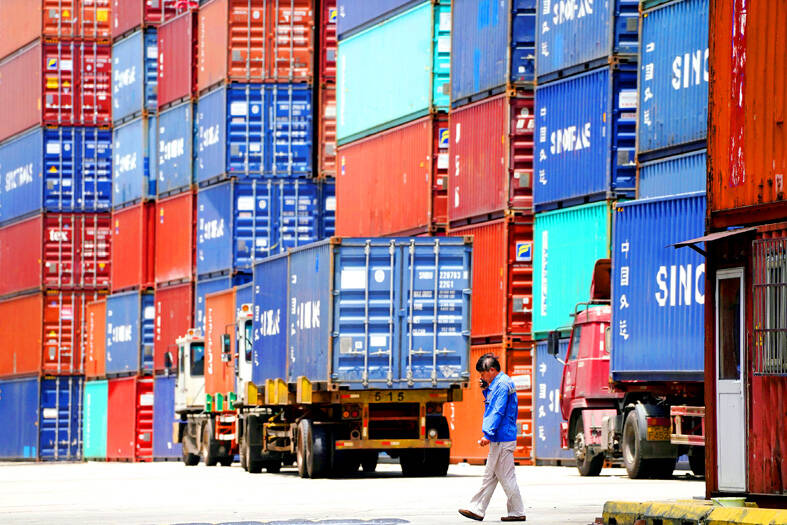China has dropped trade measures targeting Lithuania that the Baltic nation deemed illegal as the two governments discuss how to gradually move toward normalizing diplomatic relations.
A regime of “economic coercion” that was challenged at the WTO, including Lithuania being “deleted from the customs systems so no business are able to export to China,” has ended, Lithuanian Minister of Foreign Affairs Gabrielius Landsbergis told reporters in an interview on Monday.
Lithuania became embroiled in a dispute with China in 2021 after allowing Taiwan to set up a representative office under the nation’s name.

Photo: Reuters
China responded by withdrawing its ambassador to Lithuania and imposing an effective trade ban on the EU member state.
Landsbergis said that while the block on goods had now been lifted, businesses were still wary about conducting trade with China.
“There’s a huge trust issue, not just from the government, but from the business as well,” he said. “Since it has been done in the past, nobody can be sure that it cannot be repeated because it’s a non-rules-based approach.”
Chinese official customs data show little recovery in direct bilateral trade.
Imports from Lithuania were down more than 70 percent in the first 10 months of this year compared with the same period in 2021, before the row broke out.
Trade between Beijing and Lithuania collapsed in the months after the spat, with China only importing US$60,000 of goods from Lithuania in January last year, a 99.8 percent drop from a year earlier.
The EU responded on behalf of Lithuania, taking China to the WTO.
That case is still pending.
The Chinese Ministry of Foreign Affairs reiterated that Lithuania’s action on Taiwan was “wrong” and that its response was “legitimate” in protecting its interests.
“The problem is fundamentally with the Lithuanian side,” it said in a written response. “China has always acted in accordance with WTO rules and will handle relevant issues in accordance with relevant rules.”
Landsbergis said his government had been talking to China for almost two years about normalizing diplomatic relations.
“We’re having a conversation, which, I am saying, with patience, I think could provide some opportunities,” he said.
Neither side has officially reinstated its diplomats in the other country.
Leaders from the EU are expected to travel to China next week for an annual summit.
Any reduction of tensions with Lithuania might help in removing one point of conflict between the two sides.
There has also been no change to the name of Taiwan’s representative office in Vilnius, the deputy head of the Department of European Affairs at the Ministry of Foreign Affairs in Taipei said.
“This is a non-issue,” he said at a regular briefing on Tuesday.

Alain Robert, known as the "French Spider-Man," praised Alex Honnold as exceptionally well-prepared after the US climber completed a free solo ascent of Taipei 101 yesterday. Robert said Honnold's ascent of the 508m-tall skyscraper in just more than one-and-a-half hours without using safety ropes or equipment was a remarkable achievement. "This is my life," he said in an interview conducted in French, adding that he liked the feeling of being "on the edge of danger." The 63-year-old Frenchman climbed Taipei 101 using ropes in December 2004, taking about four hours to reach the top. On a one-to-10 scale of difficulty, Robert said Taipei 101

Nipah virus infection is to be officially listed as a category 5 notifiable infectious disease in Taiwan in March, while clinical treatment guidelines are being formulated, the Centers for Disease Control (CDC) said yesterday. With Nipah infections being reported in other countries and considering its relatively high fatality rate, the centers on Jan. 16 announced that it would be listed as a notifiable infectious disease to bolster the nation’s systematic early warning system and increase public awareness, the CDC said. Bangladesh reported four fatal cases last year in separate districts, with three linked to raw date palm sap consumption, CDC Epidemic Intelligence

US climber Alex Honnold left Taiwan this morning a day after completing a free-solo ascent of Taipei 101, a feat that drew cheers from onlookers and gained widespread international attention. Honnold yesterday scaled the 101-story skyscraper without a rope or safety harness. The climb — the highest urban free-solo ascent ever attempted — took just more than 90 minutes and was streamed live on Netflix. It was covered by major international news outlets including CNN, the New York Times, the Guardian and the Wall Street Journal. As Honnold prepared to leave Taiwan today, he attracted a crowd when he and his wife, Sanni,

Taiwanese and US defense groups are collaborating to introduce deployable, semi-autonomous manufacturing systems for drones and components in a boost to the nation’s supply chain resilience. Taiwan’s G-Tech Optroelectronics Corp subsidiary GTOC and the US’ Aerkomm Inc on Friday announced an agreement with fellow US-based Firestorm Lab to adopt the latter’s xCell, a technology featuring 3D printers fitted in 6.1m container units. The systems enable aerial platforms and parts to be produced in high volumes from dispersed nodes capable of rapid redeployment, to minimize the risk of enemy strikes and to meet field requirements, they said. Firestorm chief technology officer Ian Muceus said